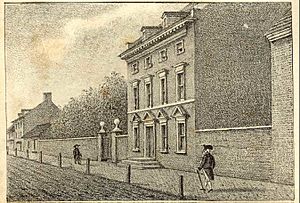Richard Penn (governor) facts for kids
Quick facts for kids
Richard Penn
|
|
|---|---|
| Acting Governor of Pennsylvania | |
| In office Late, 1771 – 1773 |
|
| Preceded by | John Penn (remained in office during Richard penn's tenure) |
| Lieutenant governor of Pennsylvania | |
| In office 1771–1773 |
|
| President of the Board at the University of Pennsylvania | |
| In office 1773–1774 |
|
| Member of the British Parliament | |
| In office 1784–1791 |
|
| In office 1796–1802 |
|
| Personal details | |
| Born | Circa 1735 |
| Died | May 27, 1811 Richmond, England |
Richard Penn Jr. (born around 1735 – died May 27, 1811) was an important figure in early American and British history. He served as the lieutenant governor of the Province of Pennsylvania from 1771 to 1773. Later, he became a member of the British Parliament. His family, the Penns, were the original founders of Pennsylvania.
Contents
Richard Penn's Early Life and Education
Richard Penn grew up in England. He was the second son of Richard Penn Sr. and Hannah Lardner. His grandfather was William Penn, who founded the colony of Pennsylvania. Richard went to Eton College, a famous school, and then studied at St John's College, Cambridge university. He also trained to be a lawyer at the Inner Temple in London.
In 1763, Richard and his brother, John, visited Pennsylvania. Their family still owned the colony at that time. Richard became a councilor, which meant he was part of the government, on January 12, 1764. In 1768, he was chosen to be a member of the American Philosophical Society. This was a group of important thinkers and scientists.
Serving Pennsylvania
In 1771, Richard Penn returned to Pennsylvania. He was appointed as the lieutenant governor. Soon after, his brother John went back to England to handle some legal matters for the colony. This made Richard the acting governor.
Richard was very popular with the people of Pennsylvania. He cared a lot about their businesses and trade. However, his uncle, who was the main owner of the colony, was not as happy with him. After two years, his brother John returned and took over as governor again.

On May 21, 1772, Richard married Mary "Polly" Masters in Philadelphia. Her mother gave them a beautiful house in the city as a wedding gift. Richard used this house to entertain important guests, including members of the Continental Congress. One of his guests was Colonel George Washington, who would later become the first president of the United States.
Richard Penn also became a trustee of the College and Academy of Philadelphia in 1772. This school is now known as the University of Pennsylvania. He served as the president of the board for the college in 1773 and 1774.
Role in the American Revolution
As the American Revolution began, Richard Penn decided to retire. He returned to England in the summer of 1775. The Continental Congress trusted him to deliver a special message to the King of England. This message was called the Olive Branch Petition. It was a last attempt to avoid war with Britain.
However, King George III refused to accept the petition. Even though the King didn't listen, Richard Penn still spoke to the House of Lords (part of the British Parliament). He told them how the American colonies felt about becoming independent.
After the American Revolution ended, the U.S. government paid Richard Penn for the land rights his family lost in Pennsylvania. He visited Philadelphia again in 1808.
Life in British Parliament
Richard Penn became a member of the British Parliament in 1784. He represented different areas, including Appleby, Haslemere, and Lancaster. He was a strong supporter of Pitt's government. Pitt was a very important Prime Minister. Richard Penn rarely spoke in Parliament. He left Parliament in 1791 but returned for another term in 1796.
Richard and Mary Penn had two sons, William and Richard, and two daughters, Hannah and Mary. Richard Penn Jr. passed away in Richmond-on-Thames, England, in 1811.
The President's House
In 1785, Richard Penn sold his Philadelphia city house to Robert Morris. From 1790 to 1800, Philadelphia was the temporary capital of the United States. During this time, Penn's old house served as the executive mansion for Presidents George Washington and John Adams. The national capital then moved to Washington, DC in November 1800.
 | Anna J. Cooper |
 | Mary McLeod Bethune |
 | Lillie Mae Bradford |

